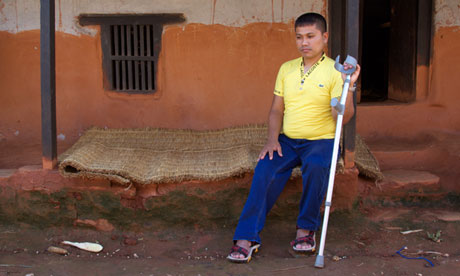When the doctors peeled back the dressing on his leg, all Bhupendra Malla Thakuri could see was a bloody, infected mess. It was almost four months since the accident, but he was still trapped in Qatar with no money and little food. His employer had all but abandoned him and within a few weeks, the doctors would begin to discuss whether to amputate his leg.
"For everything I needed, there was nothing," said Bhupendra. "I was in dire straits."
Eighteen months earlier, Bhupendra, like thousands of other poor young Nepalese men, had sought out a job overseas. He borrowed money to afford a recruitment agent’s fees and got a job as a truck driver in Qatar with a monthly salary of 1,200 riyals (about £200).
"I went to Qatar to earn money," explained the 33-year-old. "I have to send my children to school and pay for my family, but I didn’t have any money in Nepal."
On 9 June 2011, Bhupendra was called out by his manager to fix a company truck that had broken down. While he was fixing the battery, another truck slammed into the back of his. Bhupendra was thrown under the vehicle he was fixing, which rolled over him, crushing his leg. Trapped under the truck, Bhupendra lost consciousness and woke up in hospital. He stayed there for three months.
 Bhupendra Malla Thakuri faced amputation and racked up huge debts after he was injured in an accident at work in Qatar. Photograph: Pete Pattison
Bhupendra Malla Thakuri faced amputation and racked up huge debts after he was injured in an accident at work in Qatar. Photograph: Pete Pattison
When he was discharged, the hospital told Bhupendra’s employer that he must stay near the hospital and be provided with assistance at all times. Instead, the company took him back to his labour camp, miles from the hospital. Initially they provided someone to help him, but they refused to take him to hospital to have his dressing changed, and instead took him to a local clinic.
"When I was discharged … the company only paid me for the 20-odd days I had worked that month, but nothing more," said Bhupendra. "They didn’t give me my salary. They didn’t give me anything. It was a very critical situation. I was injured and my leg had become septic."
A few months after the accident, Bhupendra’s company gave him a piece of paper in English to sign. The document asked Bhupendra to agree to return to Nepal and declare he had received all his benefits. Despite his desperate situation, he refused to sign it.
"I had to return to the hospital frequently for checkups, but I didn’t have money for that," explained Bhupendra. "I needed money for transportation and medicine. There was no money for food."
The hospital staff wanted to amputate Bhupendra’s leg, but one doctor felt it could be saved, and after a difficult operation and many hours of physiotherapy, Bhupendra can now walk with the help of a crutch.
By this time the debt Bhupendra owed in Nepal had risen to 350,000 rupees (about £2,700) and he decided the only way to get compensation, or even afford the plane ticket home, was to take his case to court. After a series of tortuous legal battles, Bhupendra was eventually awarded significant compensation and he returned to Nepal on 29 July this year.
"Bhupendra’s case illustrates both the callousness with which so many companies treat migrant workers in Qatar, but also the laborious and confusing processes which migrant workers are expected to navigate in order to get their rights," said James Lynch, researcher for Gulf migrants for Amnesty International.
"It took him more than two years, and enormous stamina and courage, to get the compensation he deserved, during which time he was penniless."
Despite his ordeal, Bhupendra still believes the World Cup should be hosted in Qatar. "It’s good for the World Cup to take place in Qatar. By the time of the World Cup there will be lots of demand for construction work. Those who are going to be working during the World Cup should have proper facilities, security, they should be paid according to the hours they work, their living conditions should be good and their workplace should be safe.
But the way things are going … if the problems the workers are suffering right now are not addressed, if the lessons are not learned, people will continue to suffer. But if things are taken forward properly there may be improvements."


